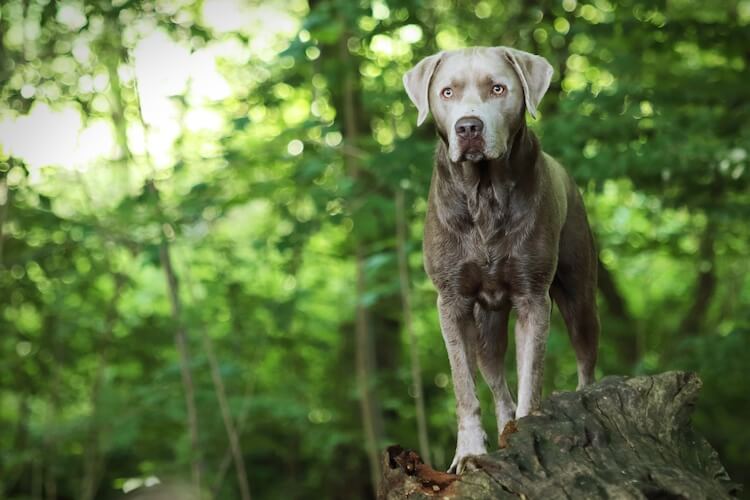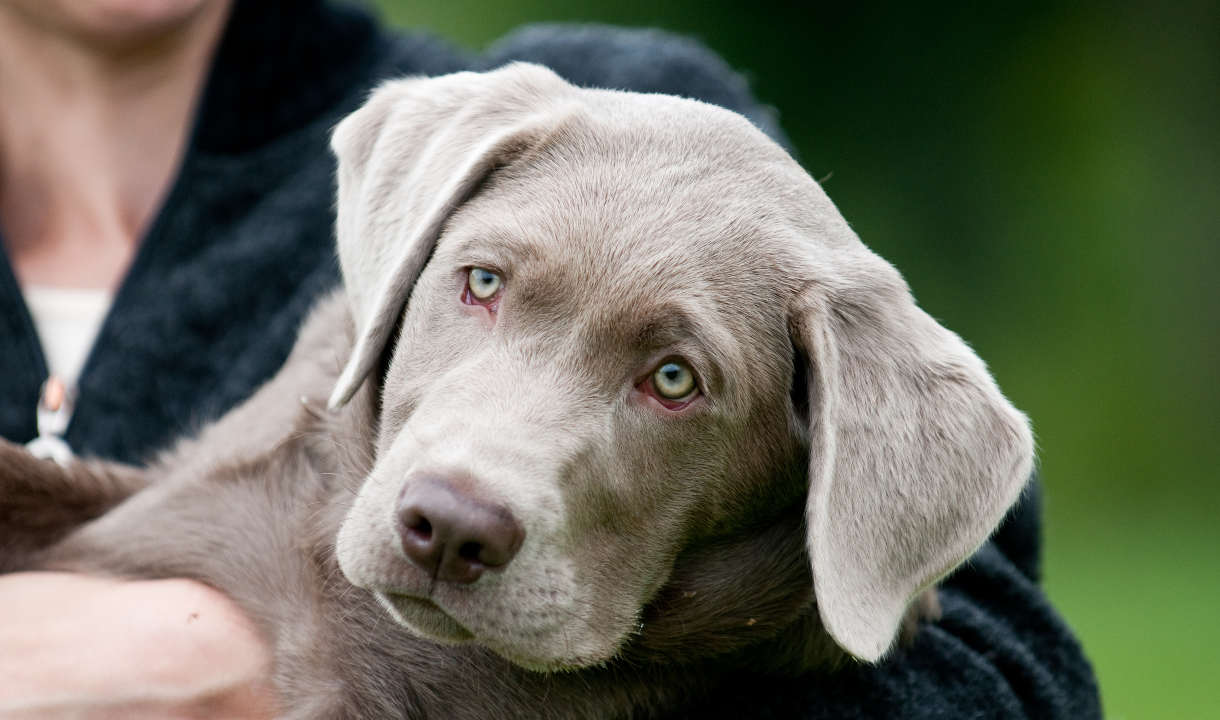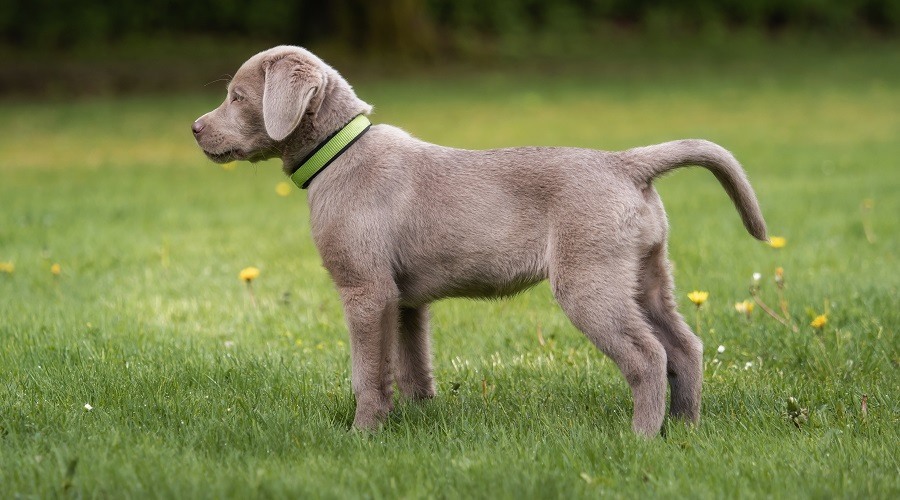Silver Labradors, a new breed of Labrador Retriever, are becoming more popular over the past few decades.

What are Silver Labs?
The Labrador Retriever Club has always set black, yellow, and chocolate as the standard colors.
Labradors remain the most popular dog breed in the world, and colors and varieties that were once rare are being seen more often.
These colors are becoming more popular than the main three colors.
The silver Labrador is one of these emerging colors. It has a diluted gene called “d”, which gives them a shiny silver coat.
Silver Labs has seen a rise in popularity over recent decades. However, there has been some controversy.
Silver Labs Controversy

There are strong opinions within the Labrador community about silver Labs and their status as purebred.
Some purists believe these silver Labs aren’t purebred Labradors because of the presence of the recessive gene in their breeding.
This is because the Weimaraner (another type of field dog used for hunting wild animals) possesses the “d” diluted gene. It is also noticeably silvery in color.
Some speculation exists that Labradors may have been crossed with Weimaraners in order to create the first silver Labradors. However, this is still unconfirmed.
Others argue that the Labrador Retriever was originally bred using a few breeds of dogs, such as the St. John’s Water Dog. This dog evolved over hundreds of generations to become the Labrador Retriever we know today.
They believe that the puppy should be considered a purebred Labrador as long as both parents are Labradors.
There are many breeders that refuse to breed or sell silver Labs. They will direct you towards more traditional colors or subsets of them. They are passionate about it!
You might also meet other breeders interested in silver Labs. They are purebred and will only breed silver Labs.
According to the American Kennel Club, the Labrador Retriever Club of the United States, silver Labs are classified under the chocolate Labs coat color category.
To clarify, breeders sometimes refer to silver Labrador puppies by the name of “diluted chocolate”.
Silver Labs in The Show Ring

If you are interested in showing your Labrador Retriever to the world, please be aware that diluted colors are not allowed in the United States.
While your silver Lab can be a great hunting dog or family companion, it is not permitted to compete in any competitions in the show ring.
While most Lab parents won’t be showing their Labs in competitive rings, it’s something that Lab parents should be aware of if they do.
How Long Do Silver Labradors Live?
A Labrador Retriever’s average lifespan is between 10-14years. However, recent data suggests that chocolate Labs could have a shorter life expectancy of 10.7 years.
Silver Labs are considered to be a diluted chocolate version, so it is possible that your silver Lab will have a similar lifespan to chocolates. However, this may be slightly shorter than the other Lab colors.
Your dog’s lifespan is dependent on its health. It is important to choose a breeder who will give you a dog with a longer lifespan and less chance of developing health problems.
Maximize your Lab’s life expectancy by doing a thorough research and selecting a Lab breeder.
How big are silver labs?
Your silver Labrador should reach the same size as other Labrador colors.
Male Labradors usually reach 70-85 lbs. However, some are larger. The average height is 24.5 inches at their shoulder.
The average female reaches 55-70 lbs and is 21.5 inches tall at the shoulder.
You might also see some Labs called “American Labs” and “English Labs”, which may reflect differences in size.
American Labs tend to be shorter and leaner than English Labs.
It doesn’t take long to find an English Lab. You can find American and English Labrador breeders in the United States.
Silver Labrador puppies cost

The average Labrador puppy can cost between $500 and $2500 depending on where you live, as well as where you get it from.
(Getting a new Labrador puppy? Before you buy your Labrador puppy, make sure to read these 6 Puppy Must-Haves.
Shelters and Lab rescue groups may have Lab puppies at the lower end of their price range, while specialty Lab breeders might be closer to the upper end.
Silver Labs tend to be less common than other colors, so it’s possible that some breeders will charge more for silver Lab pups, particularly if you don’t have many.
If you are determined to get a silver Lab, you might need to travel to find a breeder who specializes in them.
Silver Labs are good with children
The Labrador Retriever is the most beloved dog breed over the past 30 years, in part due to Labs being great dogs for families.
The silver Labrador should display the same wonderful personality traits as other Labrador colors: intelligence, athletic ability, and friendliness.
Labs can be a great choice for families. A silver Lab should have the same amazing qualities as any other Lab.
Do your research about breeders to find out what temperament the parent’s dogs are to help you decide on the best puppy for you.
Are you looking for the right dog?

Do you want a silver Labrador? Labs are very popular but not the best dog for every person.
Are you able to keep up with an athletic, active dog?
Does your Lab have access to an outdoor area?
Are you able to keep up with medical care for your dog and ensure that they receive proper wellness care?
Are You Ready to Deal with Labrador’s shedding? This can be a serious problem for most of the year.
You’re committed to the Labrador Retriever breed, and we believe you are making the right choice. You can choose any color Labrador Retriever that you like, but remember that each dog’s personality and temperament is different.
Silver Labs are now more common than ever, but you won’t be asked as many questions or raised eyebrows about them this year as you did in years past. As you make your decision, remember that there is still much controversy about breeding and gene dilution.